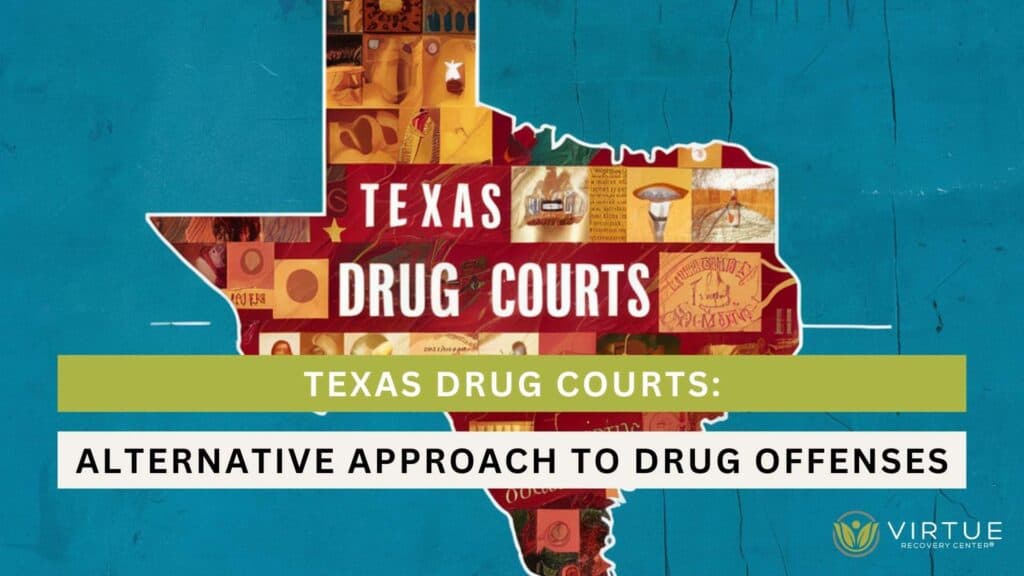Key Takeaways
- Understanding what Texas Drug Courts are and how they function.
- The benefits of drug courts for individuals and the community.
- How does the drug court process work, and who is eligible?
Introduction
The traditional methods of handling drug offenses are usually based on punishment rather than rehabilitation, which in turn results in high recidivism rates and continuous struggles with addiction. Texas Drug Courts are different; they focus on treatment and recovery instead of imprisonment. This article is about how these courts work, their advantages, and why they can be the best option for those who are accused of drug-related crimes.What are Texas Drug Courts?
Texas Drug Courts are the special programs of courts that deal with cases related to drug-addicted offenders. In contrast to the usual criminal courts that give more importance to punishment, drug courts are mainly concerned with rehabilitation and recovery. The main aim is to cut down the drug addiction and prevent future offenses by giving the participants a chance to get into full treatment programs.The Benefits of Drug Courts
Drug courts are a source of many advantages for individuals and the community. Drug courts for individuals are a structured environment that helps in recovery through regular drug testing, counseling, and treatment programs. This method has been proven effective in reducing recidivism and enabling the participants to start a new life. Drug courts greatly benefit the community as they considerably cut down on crime rates and, thus, decrease the load on the criminal justice system, which in turn leads to cost savings and safer neighborhoods. This is the way drug court participants with drug dependency problems get help.How Texas Drug Courts Work
Successful drug court planning is the key to this system’s functioning. The process starts when an individual is referred to a drug court by a judge, attorney, or probation officer. After being admitted to the program, the participants go through a detailed assessment, which is used to find out their needs, and then a treatment plan that best suits them is developed. The drug court team, consisting of judges, probation officers, treatment providers, and case managers, supervises each participant’s progress. Frequent court appearances and progress reviews are the means of accountability, and at the same time, they create a chance for encouragement and support. After successfully completing the program, participants may have their charges reduced or dismissed and thus start a new life.Eligibility and Entry into Drug Court
Drug court programs have different conditions, but they usually include nonviolent offenders who have a record of substance abuse. The criminal justice system usually sends candidates, or they can apply directly. The first step of the screening process is thoroughly examining the person’s criminal record, substance abuse history, and readiness to participate in the program. This evaluation determines the candidate’s suitability for the program and which treatments will be most helpful.The Treatment Plan
Every Texas Drug Court program participant is given a tailor-made treatment plan that is meant to suit his or her individual requirements. The plans of this kind usually include a mixture of counseling, medical treatment, and support services that are aimed at the root causes of addiction. Drug testing and progress monitoring are the means that assist in keeping the participants on track. The goal is not only to be sober but also to give the participants the skills they need so that they can stay clean for a long time.The Drug Court Model: Best Practices
The Drug Court Model in Texas is a mixture of the best practices that are supposed to be effective at dealing with drug abuse and reducing recidivism. The main elements are integrating treatment services with judicial case processing, the sustained interaction between judges and participants, and the close monitoring of participants through regular drug testing and court appearances. The model stresses a non-adversarial way of conducting the case where the prosecution and defense counsel work together to help the victim recover and be responsible for his/her actions. Besides, Texas Drug Courts pay attention to individualized treatment plans that consider each participant’s specific needs, such as mental health services, education, and job training. By creating a supportive and well-organized environment, Texas Drug Courts assist participants in reaching long-term recovery and reintegration into the community, which indicates that they apply a comprehensive and compassionate approach to justice and rehabilitation.Connecting Drug Courts to Law Enforcement
The link between Drug Courts and law enforcement in Texas is the key to the success of the Drug Court Model. The cooperation between Drug Courts and police agencies guarantees that participants are responsible for their actions while at the same time, they get all the support they need to overcome addiction. Law enforcement officers are the main people who monitor compliance, do home visits, and give useful information about participants’ progress and problems. This collaboration is the main reason for a common effort to decrease substance abuse-related crime, improve public safety, and help participants in their rehabilitation. Drug Courts and law enforcement can better tackle the reasons for criminal behavior, promote recovery, and make Texas safer by working together. Additionally, this partnership enables the identification of emerging trends in substance abuse, such as the rise of club drugs in Texas nightlife, which are increasingly becoming a concern for both law enforcement and public health officials. By sharing data and insights, Drug Courts and police can develop targeted interventions that focus on prevention and education for at-risk populations. Ultimately, this collaborative approach not only aids in the rehabilitation of individuals but also fosters a healthier community environment, reducing the allure and impact of these dangerous substances.Monitoring and Support
The drug court model is characterized by continuous support and monitoring. The participants must be present at the regular court sessions where their progress is checked, and they get feedback and encouragement. This design is highly accountable, which is very important for maintaining sobriety. Besides the judicial control, participants are also helped by a support network that consists of mentors, peer support groups, and community resources. The full support system this program provides motivates and connects people, so the possibility of relapse is decreased.Challenges and Success Stories
Drug courts are a good way to avoid traditional sentencing, but at the same time, participants will have to face some problems, like getting rid of their deeply rooted habits and dealing with social and economic factors that lead to addiction. Nevertheless, many people have overcome these difficulties and graduated from the program to become productive, drug-free citizens. Texas Drug Court success stories are proof of how this approach can transform people, showing that when you have a comprehensive support and accountability system, it really makes a difference.How Do Houston’s Harm Reduction Policies Influence the Effectiveness of Texas Drug Courts?
Houston harm reduction policies play a crucial role in shaping the dynamics of Texas drug courts. By prioritizing treatment and support over punitive measures, these policies enable offenders to engage in recovery programs. This compassionate approach enhances the likelihood of successful rehabilitation, reducing recidivism and promoting healthier community outcomes.








